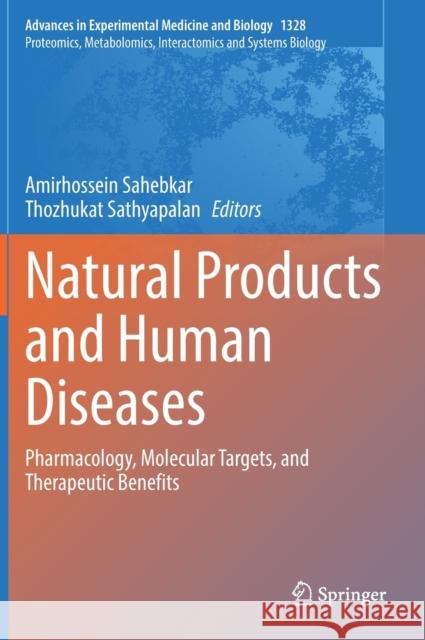Natural Products and Human Diseases: Pharmacology, Molecular Targets, and Therapeutic Benefits » książka



Natural Products and Human Diseases: Pharmacology, Molecular Targets, and Therapeutic Benefits
ISBN-13: 9783030732332 / Angielski / Twarda / 2022 / 225 str.
Natural Products and Human Diseases: Pharmacology, Molecular Targets, and Therapeutic Benefits
ISBN-13: 9783030732332 / Angielski / Twarda / 2022 / 225 str.
(netto: 764,96 VAT: 5%)
Najniższa cena z 30 dni: 771,08
ok. 22 dni roboczych.
Darmowa dostawa!
1. Effects of Curcuminoids on Systemic Inflammation and Quality of Life in Patients with Colorectal Cancer Undergoing Chemotherapy: a Randomized Controlled Trial
2. Curcumin and Piperine Combination for the Treatment of Patients with Non-alcoholic Fatty Liver Disease: a Double-Blind Randomized Placebo-Controlled Trial
3. Evaluation of the Effects of Nanomicellar Curcumin, Berberine and their Combination with 5-fluorouracilon Breast Cancer Cells
4. The effect of herbal medicine and natural bioactive compounds on plasma adiponectin: a clinical review
5. The effects of nutraceuticals and bioactive natural compounds on chronic periodontitis: a clinical review
6. The multifaceted actions of curcumin in obesity
7. Antiviral plants in view of Avicenna's Canon of Medicine and modern medicine against common cold
8. Antifungal activity of curcuminoids and difluorinated curcumin against clinical isolates of Candida species
9. Investigation of the effects of difluorinated curcumin on glycemic indices in streptozotocin- induced diabetic rats
10. Evaluation of the Effect of Crocin on Doxorubicin-Induced Cardiotoxicity
11. The role of chemokines in cardiovascular diseases and the therapeutic effect of curcumin on CXCL8 and CCL2 as pathological chemokines in atherosclerosis
12. Health benefits of turmeric and curcumin against food contaminants
13. The effects of curcumin plus piperine supplementation in patients with acute myocardial infarction: a randomized, double-blind and placebo-controlled trial
14. Protective effects of curcumin on pulmonary arterial hypertension
15. Protective effects of curcumin in the reproductive system: anti-toxic, semen cryopreservative and contraceptive actions
16. Protective effects of curcumin phytosomes against high-fat diet-induced atherosclerosis
17. The effects of curcumin on the side effects of anticancer drugs in chemotherapy: A randomized controlled trial
18. Crocin Improves Diabetes-Induced Oxidative Stress via Down-Regulating the Nox-4 in Myocardium of Diabetic Rats
19. Role of herbal medicines in the management of brain injury
20. The effects of ginsenosides on the Nrf2 signaling pathway
21. The effect of green coffee bean extract on cardiovascular risk factors: A systematic review and meta-analysis
22. Nanomicellar curcumin supplementation improves the clinical manifestations of HAM/TSP patients
23. The effects of Ivy (Hedera helix) on respiratory problems and cough in humans: a review
24. Safety and efficacy of oral supplementation of lentil (Lens culinaris Medic) in dry eye patients
25. A review of Glycyrrhiza Glabra (Licorice) effects on Metabolic Syndrome
26. Natural insulin sensitizers for the management of diabetes mellitus: a review of possible molecular mechanisms
27. Evaluation of the anti-constipation effects of abdominal application of olive oil ointment in children 1-4 years old: A pilot placebo-controlled, double-blind, randomized clinical trial
28. Therapeutic Potential of Pomegranate in Metabolic Disorders
29. Resveratrol as a Probable Multi-headed Treatment approach for COVID-19
30. A review on the phytochemistry, pharmacology, and therapeutic effects of Rheum ribes
31. Anti-tumor and protective effects of melatonin: the potential roles of microRNAs
32. Antioxidant effects of trehalose in an experimental model of type 2 diabetes
33. Investigation of the effects of trehalose on glycemic indices in streptozotocin-induced diabetic rats
34. Hepatoprotective effect of Trehalose: insight into its Mechanisms of Action
35. Effect of vitamin D supplementation on the regulation of blood pressure in Iranian patients with essential hypertension: a clinical trial
36. Boosting GLP-1 by natural products
37. Naturally occurring SGLT2 inhibitors: a review
38. Renoprotective roles of curcumin
Amirhossein Sahebkar, PharmD., PhD., is Associate Professor of Pharmaceutical Biotechnology in the School of Pharmacy at the Mashhad University of Medical Sciences in Iran, and Honorary Research Fellow in the School of Health and Medical Sciences at the University of Western Australia. He has published more than 1100 articles on areas including blood lipids, neurovascular diseases, modern medical treatments in cellular, molecular, and animal tissues, and atherosclerosis. He is a highly cited researcher in the field of Pharmacology and Toxicology and has an h-index of 85.
Thozhukat Sathyapalan, MD., FRCP., FACP., is the Chair in Academic Diabetes, Endocrinology and Metabolism in Hull York Medical School, University of Hull and Honorary Consultant Endocrinologist at Hull and East Yorkshire Hospitals NHS Trust, United Kingdom. His main area of interest is on modulation of cardiometabolic risk through pharmacological and nutritional interventions. He has conducted several clinical trials in this area. He has also published and presented extensively in this field.
Natural products have a long history of use as folk medicines in several systems of traditional medicine. Extensive evidence from modern pharmacological studies has confirmed traditional applications, and unveiled the vast potential of naturally occurring compounds, particularly plant-derived phytochemicals, in the management of chronic human diseases. The past decade has witnessed a surge of findings from randomized controlled trials testifying the safety and efficacy of natural products as adjuncts or alternatives to standard-of-care medications for several illnesses. Biomolecular studies have unveiled hundreds of cellular and molecular targets for phytochemicals including key transcription factors, receptors, enzymes, hormones, neurotransmitters, cytokines, lipids, and non-coding RNAs.
Extensive research on the preventative and therapeutic effects of natural products necessitates regular updating of the literature as to the developing potential roles of these compounds in different human diseases. This new book provides an overview of the current pharmacological and clinical features of natural products, and the role of phytopharmaceutical compounds in health and diseases. Chapters cover a wide scope, from cancers, to chronic and age-related disorders, and are written by leading international subject experts. Collectively, chapters will provide useful insights on the regulatory effects of phytochemicals and nutraceuticals on pathogenic molecular signatures associated with pathologies, disease biomarkers, and aging-related pathways.
1997-2026 DolnySlask.com Agencja Internetowa
KrainaKsiazek.PL - Księgarnia Internetowa









